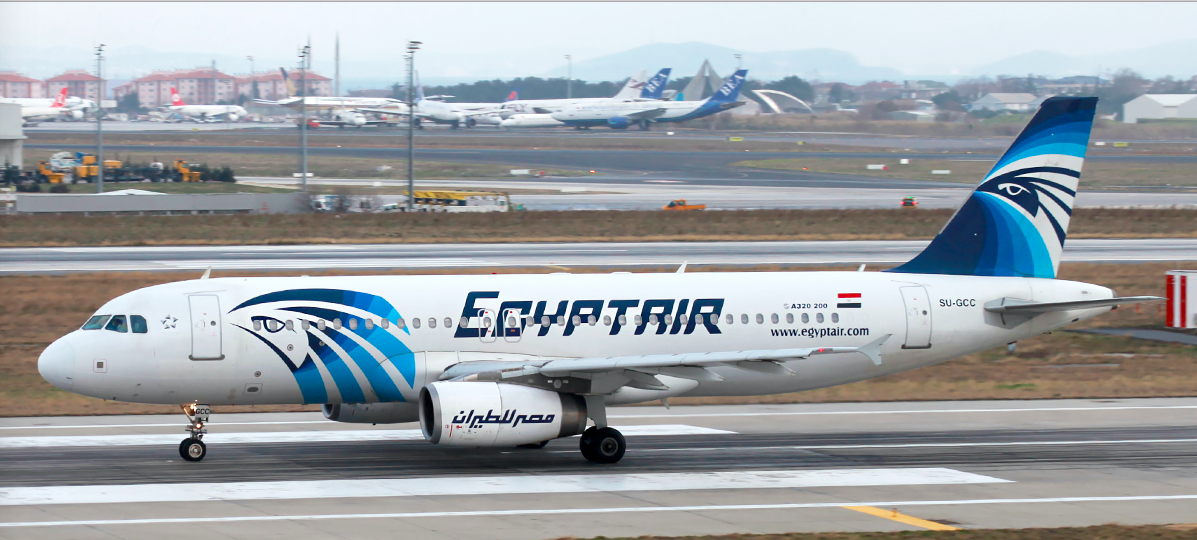On May 19, 2016 EgyptAir flight 804 took off from Paris Charles de Gaulle headed for Cairo. The Airbus A320 crashed in the Mediterranean Sea, killing all 66 people on board.
Smoke was detected in the aircraft’s lavatories and in the avionics bay. There was apparently a fire at the front of the aircraft and passengers congregated at the rear. However no mayday calls were placed. Several sections of the wreckage were recovered, along with both the cockpit voice and data recorders.

(Occurrence Aircraft Four Months Prior to Crash, Credit: Firat Cimenli via Wikimedia Commons)
Seven months into the accident investigation Egypt announced that the cause of the crash was terrorism, with traces of explosives found on passenger bodies. Since the plane contained French passengers France conducted its own investigation, and provided assistance. French officials have cast skepticism about the terrorism claim suggesting that the long period of time that bodies were in the water would have made it impossible to identify trace explosives.
The Wall Street Journal obtained a leaked report the casts further doubt on the explanation offered by Egyptian authorities – repeated maintenance issues with the aircraft that went unaddressed.
The plane registered serious mechanical errors on its final five flights, according to automated messages sent by the plane. EgyptAir pilots and the airline’s technical center in Cairo largely ignored those errors, according to the documents. Investigators are also questioning whether the EgyptAir technician who inspected the plane in Paris was qualified to service aircraft in Europe.
The aircraft flew Cairo – Asmara – Tunis – Cairo the day before flying to Paris. On those flights the A320 “registered technical faults with bathroom smoke detectors, a circuit breaker and a system that uses heated engine air to control the main cabin’s climate and air pressure, according to the 2018 expert report.” On its flight to Paris it registered two issues. Those faults were never mentioned in post-flight reports “even though the faults would have set off warnings and in some cases audio alarms inside the plane” and an EgyptAir mechanic in Paris reported that he was never alerted to the issues the plane had been having.
Then when the plane departed Paris on its final fateful journey ” a bathroom smoke detector went off, followed by a cascade of other faults.” The cockpit voice recorder suggests a high-pressure oxygen leak followed by a declaration by the captain that a fire broke out. Maintenance had twice been performed on the cockpit oxygen systems, including three days prior to the crash. EgyptAir’s documentation of this maintenance went missing.
Star Alliance member EgyptAir, like Ethiopian, has enjoyed a strong reputation in international aviation however recent issues raise questions about that reputation.


Gary – Thanks for the information, as it’s always good to have more facts to make better decisions on whether to fly an airline. That said, I’d probably omit the Star Alliance mention in the headline as being irrelevant.
@Christian – one role that alliances have played is in enforcing certain standards across carriers, and they’ve effectively served as a certifier that customers can trust a carrier, I actually think it’s relevant.
It is sobering because I must have flown on this aircraft, probably more than once, being a regular user of Egyptair on Europe sectors ( prior to Qatar being kicked out of CAI). Had this been the day flight from CDG, it’s likely there would have been more than double the number of casualties.
We know from MS990, JFK-CAI, that Egyptair is perfectly willing to obfuscate and deceive if they feel the need.
@Christian
Why on earth is Star Alliance irrelevant? They are tolerating one of their members covering up a serious incident. There will also be a lot of people booking flights with other star alliance carriers and not realising they are “Operated by EgyptAir”.
Alliances taking strong action against members not only risking flight safety but trying to cover it up is another way behaviour such as this can be stopped. If they don’t they are just as liable.
@Christian… Star Alliance is a brand, much like Boeing 737Max is. But you are probably right, the maintenance historyof the accident supports the theory this is a one time event.